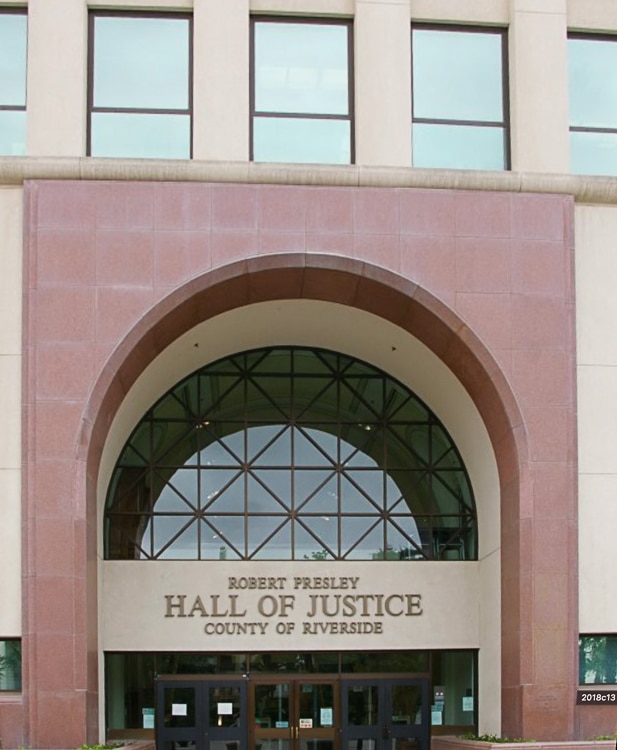Protective Order for Accuser Dropped
RIVERSIDE (CNS) – A sexual battery case was tossed by a Riverside County Superior Court judge after a snafu involving summonses for jurors — compounded by lack of courtroom space — in one of hundreds of criminal case dismissals that District Attorney Mike Hestrin today called a “crisis.”
According to the District Attorney’s Office, the case, People v. Jose Cruz, spotlights the ongoing public safety threat stemming from the raft of dismissals, which began in early October.
The Cruz matter was booted by Superior Court Judge John Molloy at the Riverside Hall of Justice Friday. The misdemeanor case was filed in November 2021, arising from an alleged lewd act a month earlier in the Riverside area, according to court records.
Prosecutors said they were ready to proceed with a trial on Dec. 7, but when panels of prospective jurors were requested for screening, Molloy was informed that no jurors would be available because the court’s vendor, which wasn’t identified, hadn’t sent summonses to residents to ensure a jury pool would be in place that day.
The judge postponed the matter until prospects could be summoned, but after that issue had been resolved, the parties were told there were no courtrooms available for further proceedings, at which point Molloy dismissed the case, according to the District Attorney’s Office.
The dismissal resulted in the criminal protective order for the victim being terminated. The woman, who asked to remain anonymous,. released a statement through the District Attorney’s Office, saying “I do not agree with the court’s decision, and I am disappointed that justice was not served. He is now a free man … who received zero consequences.”
Hestrin fixed the blame squarely on the court, saying there shouldn’t have been “a failure to summon jurors on the day when a courtroom was ready and available.”
“The public is owed an explanation for the apparent lack of oversight of a third-party vendor contracted by the courts to summon jurors for this trial and for trials across the county for the entire month of December,” he said. “This crisis is unacceptable and only adds to the daily toll of cases being dismissed by the courts.”
The Superior Court Executive Office did not immediately respond to a request for comment.
The district attorney’s office said more than 1,000 cases have been vacated since Oct. 10. The majority have been unilaterally closed by judges at the Larson Justice Center in Indio, with smaller numbers at the Banning Justice Center, Southwest Justice Center in Murrieta, Riverside Hall of Justice and Blythe Courthouse.
Judges have cited lack of available courtroom space for trials as the main rationale for the dismissals. Most of the cases were added to dockets during the COVID-19 public health lockdowns, when courts suspended many operations under emergency orders from the California Office of the Chief Justice.
A backlog of roughly 2,800 cases developed. The chief justice’s orders expired on Oct. 7.
The lion’s share of cases being dismissed stem from alleged acts of domestic violence. The state constitution entitles defendants to receive a speedy disposition of their cases at trial.
Superior Court Presiding Judge John Monterosso released a statement on Oct. 25 acknowledging the court system was bearing a heavy load, traced to the lockdowns and consequent changes in court operations.
“I share others’ frustration when a case is not resolved on the merits, or due process is impaired, due to a lack of available judicial resources,” Monterosso said. “The genesis of the current set of circumstances is the chronic and generational lack of judges allocated to serve Riverside County.”
He emphasized the county has 90 authorized and funded judicial positions, but a 2020 Judicial Needs Assessment Study noted that 115 judicial officers are needed to ensure efficient operations throughout the local court system and prevent logjams.
“The dispensing of statutory timelines for criminal trials under the emergency orders delayed the `day in court’ for numerous criminal defendants and those impacted by the alleged crimes,” Monterosso said.
“While the law allows a court to continue a case beyond the statutory deadline for `good cause,’ the decision on whether `good cause’ exists is an individualized decision made by the trial judge based on the law and the facts of the case.”
Hestrin questioned the legitimacy of basing dismissals on a deficit of judicial resources, given that “this has been the case as far back as anyone can remember.”
“If we have an emergency in our courts that justifies a dismissal of a felony, then it should be an emergency in every courtroom across the county and should justify an all-hands-on-deck approach to trying cases,” Hestrin said. “The consequences of the decisions being made from our judges is going to cause extreme harm to victims of crime and our community at-large.”
The backlog is reminiscent of the cumulative impact of a buildup of unresolved criminal cases in 2007 that prompted the state to dispatch a “judicial strike team” to the county to help sort through criminal cases clogging the court system.
At the time, the Superior Court virtually halted civil jury trials for months while judges focused on reducing the strain on resources. An empty elementary school was even converted into a makeshift courthouse.



Your point of view caught my eye and was very interesting. Thanks. I have a question for you.
Can you be more specific about the content of your article? After reading it, I still have some doubts. Hope you can help me.
Your point of view caught my eye and was very interesting. Thanks. I have a question for you.
Thanks for sharing. I read many of your blog posts, cool, your blog is very good.
Can you be more specific about the content of your article? After reading it, I still have some doubts. Hope you can help me.
Thanks for sharing. I read many of your blog posts, cool, your blog is very good.
Thank you for your sharing. I am worried that I lack creative ideas. It is your article that makes me full of hope. Thank you. But, I have a question, can you help me?
Your article helped me a lot, is there any more related content? Thanks!
I don’t think the title of your article matches the content lol. Just kidding, mainly because I had some doubts after reading the article.
I don’t think the title of your article matches the content lol. Just kidding, mainly because I had some doubts after reading the article. https://www.binance.info/zh-TC/register?ref=DCKLL1YD